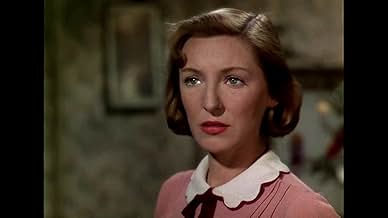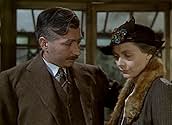CALIFICACIÓN DE IMDb
7.3/10
4.2 k
TU CALIFICACIÓN
Justo después de la Primera Guerra Mundial, la familia Gibbons se muda a una bonita casa en los suburbios. Llevan una vida normal a lo largo de los años, pero todo cambia cuando estalla la S... Leer todoJusto después de la Primera Guerra Mundial, la familia Gibbons se muda a una bonita casa en los suburbios. Llevan una vida normal a lo largo de los años, pero todo cambia cuando estalla la Segunda Guerra Mundial.Justo después de la Primera Guerra Mundial, la familia Gibbons se muda a una bonita casa en los suburbios. Llevan una vida normal a lo largo de los años, pero todo cambia cuando estalla la Segunda Guerra Mundial.
- Premios
- 1 premio ganado en total
Robin Burns
- Man in Crowd
- (sin créditos)
Mabel Etherington
- Lady in Crowd
- (sin créditos)
Dan Lester
- Man in Crowd
- (sin créditos)
Jim Morris
- Man Operating Small Boats at Fairground
- (sin créditos)
Argumento
¿Sabías que…?
- TriviaThe voice of the uncredited opening narrator is that of Laurence Olivier.
- ErroresFrank is shown reading a copy of the 16 September 1930 edition of the Daily Mirror with the headline story about the elections in Germany held on 14 September where the Nazi Party increased their seats in the Reichstag from 12 to 107. He then goes to the back yard to help shake out the tablecloth, but the cherry tree there is still in full bloom, months after the blossoms should have disappeared.
- Citas
Frank Gibbons: She didn't pass on, pass over, or pass out! She died!
- Créditos curiososOpening credits prologue: This is the story of a London family from 1919 to 1939.
- ConexionesFeatured in Jonathan Ross' Must-Watch Films: Crime Films (2023)
- Bandas sonorasRule Britannia
(uncredited)
Lyrics by James Thomson
Music by Thomas Augustine Arne
Sung by Robert Newton (Frank) and Stanley Holloway (Bob) coming home after their reunion
Opinión destacada
What really boosts THIS HAPPY BREED into the "superior" category of British films is the direction by David Lean and the two central performances by CELIA JOHNSON and ROBERT NEWTON as the heads of a rather ordinary household living the provincial life between two World Wars. And what is surprising is that this '44 film from the U.K. uses Technicolor in an age when most films, unless they were spectacular musicals, were filmed in B&W. The color photography adds a handsome touch to the otherwise unspectacular story that is more a character study of a marriage and family relationships.
CELIA JOHNSON does a magnificent job as the mother who raises a daughter (KAY WALSH) unsatisfied with her family's social status, who yearns to rise above what she perceives as too provincial and runs off with a married man. It's just one of the many episodic tales in this domestic drama but it's played with such intensity by Johnson that the reunion scene toward the end is heartbreaking to watch.
All of the saga which stretches between the two wars is episodic, told in a series of vignettes which I imagine were done in blackout style on the stage, for which the tale was written. But Lean has successfully managed the transfer to the screen and all of the performances are top notch, particularly ROBERT NEWTON as the concerned father, JOHN MILLS as a man caught in an unrequited love affair and STANLEY HOLLOWAY who provides a good deal of comic relief as a boozy neighborhood friend of Newton.
Noel Coward evidently had more success in telling domestic tales with sharp observation of characters than Edna Ferber did with her own American sagas in which her characters seemed to get lost among all the vast territory she covered.
Summing up: Well worth watching for the performances alone.
CELIA JOHNSON does a magnificent job as the mother who raises a daughter (KAY WALSH) unsatisfied with her family's social status, who yearns to rise above what she perceives as too provincial and runs off with a married man. It's just one of the many episodic tales in this domestic drama but it's played with such intensity by Johnson that the reunion scene toward the end is heartbreaking to watch.
All of the saga which stretches between the two wars is episodic, told in a series of vignettes which I imagine were done in blackout style on the stage, for which the tale was written. But Lean has successfully managed the transfer to the screen and all of the performances are top notch, particularly ROBERT NEWTON as the concerned father, JOHN MILLS as a man caught in an unrequited love affair and STANLEY HOLLOWAY who provides a good deal of comic relief as a boozy neighborhood friend of Newton.
Noel Coward evidently had more success in telling domestic tales with sharp observation of characters than Edna Ferber did with her own American sagas in which her characters seemed to get lost among all the vast territory she covered.
Summing up: Well worth watching for the performances alone.
- Doylenf
- 7 jul 2007
- Enlace permanente
Selecciones populares
Inicia sesión para calificar y agrega a la lista de videos para obtener recomendaciones personalizadas
- How long is This Happy Breed?Con tecnología de Alexa
Detalles
- Fecha de lanzamiento
- País de origen
- Idioma
- También se conoce como
- Srecna porodica
- Locaciones de filmación
- Alderbrook Road, London, Greater London, Inglaterra, Reino Unido(exteriors of family house near corner with Bellamy St. - still standing in 2022)
- Productoras
- Ver más créditos de la compañía en IMDbPro
Taquilla
- Presupuesto
- GBP 200,000 (estimado)
- Total a nivel mundial
- USD 158
- Tiempo de ejecución1 hora 55 minutos
- Color
- Relación de aspecto
- 1.37 : 1
Contribuir a esta página
Sugiere una edición o agrega el contenido que falta

Principales brechas de datos
By what name was This Happy Breed (1944) officially released in India in English?
Responda






























